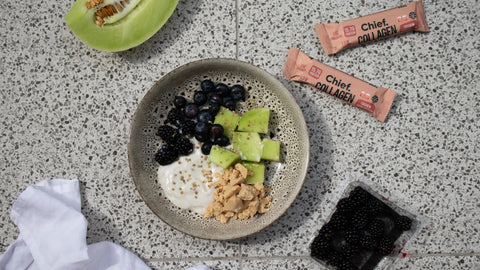Picture the crisp morning air and the energy at the start line of your 5K or 10K race. Months of training have brought you here, but what truly powers your stride is your nutrition—tailored to you, free from fads or confusion. Whether you follow keto, low-carb, or a carb-inclusive diet, you don’t need to change your eating habits to succeed, contrary to all the ‘information’ out there making you feel like you can’t run well unless you stuff your face with pasta.
While marathon nutrition can feel overwhelming, a 5K or 10K is simpler. You don’t need to carb-load or rely on gels if they don’t fit your style. Science shows that both low-carb and carb-inclusive approaches can fuel exceptional performance when properly executed. What matters is starting with full glycogen stores, staying hydrated, and recovering well.
Carbs
Carbohydrates are the body’s fastest and most efficient energy source during high-intensity efforts. Muscle glycogen fuels your pace. Research consistently shows that consuming 6-10 grams of carbs per kilogram of body weight boosts glycogen stores, enhances endurance, and reduces fatigue. Go for a good quality carbohydrate source from whole foods rather than ultra-processed snacks and gels. You don’t need gels for events that last less than one hour. Our top tips are bananas, honey, rice and sweet potatoes. But any whole food source that doesn’t upset your stomach is acceptable.
Low-carb or Keto Runners
Science shows that a ketogenic diet does not diminish endurance performance as once believed. Keto-adapted runners efficiently use fat as their primary fuel source, which allows them to conserve glycogen for high-intensity bursts like sprints or hills. Well-adapted athletes can perform at up to 70% of their VO2 max using fat as their primary energy source, demonstrating impressive metabolic flexibility. This shift in fuel utilisation reduces carbohydrate dependence and helps prevent mid-race energy crashes, which are common with carb-reliant athletes. No more ‘hitting the wall’!!! With fat providing a stable, near-limitless energy source, keto athletes avoid the highs and lows of blood sugar fluctuations and can sustain steady performance over long distances. A Chief Collagen Coffee with MCT oil or a Chief Collagen Bar can further support this endurance by delivering a quick, sustained energy boost from ketones without relying on carbs, while collagen supports joint and tendon health—essential for runners pushing their limits.
Protein
Protein is essential for muscle repair, recovery, and joint health, regardless of your diet, with sports nutrition guidelines recommending 1.4 to 2.2 grams of protein per kilogram of body weight daily for runners. Collagen, in particular, is a game-changer for supporting connective tissues, which take a beating from repetitive impact. Sports scientists recommend taking 10-15 grams of collagen with vitamin C about 30 to 60 minutes before training to stimulate collagen synthesis, helping to strengthen tendons and ligaments and reduce the risk of injury. This is because vitamin C plays a key role in converting proline, an amino acid in collagen, into the form your body uses to build strong connective tissue. We love Unfavoured Chief Collagen Protein in our pre-race coffee. After your run, it’s crucial to replenish with high-quality protein sources, such as eggs, meat, Chief Beef Bars, or Biltong, to accelerate muscle repair, reduce soreness, and support adaptation from training. These protein-rich options provide the essential amino acids your body needs to rebuild muscle fibres and promote recovery, helping you bounce back faster and train harder.
Hydration and Electrolytes
Hydration and electrolytes are critical for performance, as even a 2% loss in body fluids can reduce performance by 20%, according to sports physiology research. Electrolytes, especially sodium, help maintain muscle function and prevent cramps. Here’s a simple hydration plan:
Pre-race (90 minutes before)
Drink 500ml of electrolyte water containing 500–700mg of sodium to boost plasma volume.
During the Race (especially if hot)
Sip 150–250ml of an electrolyte solution containing 200–300mg of sodium to maintain hydration and prevent cramps.
Post-Race
Rehydrate with 1.5 times the fluid lost during the race. Ensure your drink contains 600–800mg of sodium per litre to support recovery and restore electrolyte balance.
Tip: Weigh yourself before and after the race to estimate fluid loss and adjust your rehydration accordingly.
Do You Need Gels for a 5K or 10K?
The short answer is NO. Gels are designed for races lasting over 60 minutes, where glycogen stores may become depleted. For shorter races like a 5K or 10K, your body’s glycogen stores—when adequately topped up with a solid pre-race meal—are more than enough to fuel your performance from start to finish. A well-balanced pre-race meal, eaten 2-3 hours before the race, provides steady energy without needing mid-race gels.
In fact, skipping gels for shorter races can be beneficial. Gels are packed with simple sugars, which can cause rapid blood sugar spikes followed by crashes, leaving you feeling sluggish or fatigued before you reach the finish line. Additionally, consuming gels when your body doesn’t need them can increase the risk of gastrointestinal discomfort, such as cramping, bloating, or nausea—common issues for runners who take in too much sugar too quickly. Instead of relying on gels, focus on proper pre-race fuelling and hydration.
Race Nutrition Tips for Your Eating Style
Carb-Inclusive Runners
Macro Split: 50-60% carbs, 20-25% protein, 20-25% fats.
Pre-Run (30-60 minutes before): Banana with coffee.
Post-Run: Chief Collagen Bar and smoothie.
Low-Carb/Keto Runners
Macro Split: 5-10% carbs, 20-25% protein, 65-75% fats.
Pre-Run (30-60 minutes before): Chief Collagen Coffee with MCT oil.
Post-Run: Chief Beef Bar and macadamia nuts.
The Micronutrients Runners Can’t Afford to Miss
Runners have increased nutrient needs due to higher metabolic demands and losses through sweat. Getting these key nutrients from animal-based foods or Chief products ensures optimal performance and recovery.
Iron
Vital for oxygen transport, helping deliver energy to muscles during runs. Runners, especially women, often have low levels due to sweat loss and foot-strike haemolysis (breaking of red blood cells from impact)—best sources: Chief Liver Capsules, grass-fed beef, and organ meats.
Vitamin D
Essential for bone health and immune support. Low levels increase the risk of stress fractures and illness, especially for runners training indoors or during winter. Best sources: Oily fish, eggs, and Chief Liver Capsules + sunlight.
Magnesium
Prevents muscle cramps, aids recovery, and supports sleep. Runners lose magnesium through sweat, especially in hot conditions. Best sources: Grass-fed meat, liver, and bone broth.
Zinc and Copper
Support immune function, muscle repair, and red blood cell production. Both are lost through sweat, making runners more prone to deficiency. Best sources: Grass-fed beef, liver, and Chief Liver Capsules.
Vitamin B12
Crucial for energy metabolism, red blood cell production, and nerve function. This is especially important for low-carb runners relying on fat for fuel. Best sources: Grass-fed beef, liver, eggs, and Chief Liver Capsules.
Test Your Nutrition at the Run Army Race
Ready to see how your nutrition stacks up? Join the Run Army race in Brisbane this March. Chief Nutrition will be there to fuel your journey and provide a free Run Army Nutrition Guide to all participants. Whether you’re sprinting a 5K or pushing through a 10K, you’ll run your best race your way—with whole foods, smart supplementation, and confidence in your plan.
See you at the finish line!





Comments (0)
There are no comments for this article. Be the first one to leave a message!